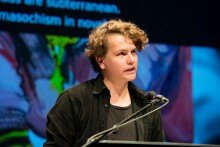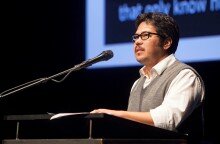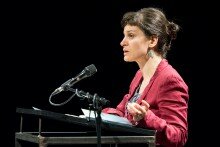An interview with Tahel Frosh

Tahel Frosh has managed to break out of the built-in marginality of the poetry world: a combination of the solid quality of her work and the sharp socio-economic statement it makes have brought her to center stage in [the financial media - print, radio and television], not exactly where you’d expect to encounter a book of poetry.
Prof. Nissim Calderon describes Frosh’s book Avarice as “breaking through the glass wall that has arisen around Hebrew poetry in recent years, one that has created a stir beyond the regular audience of poetry readers. People feel the book touches on their own fathers, films they’ve seen and the neighborhoods where they were raised and on their finance minister and their minister of defense. They feel that Frosh has given them something she plucked from her own life but that reaches deep within their experience. Poetry must do this and this book does”.
[…]
Q: There is something surprising about your [middle class] biography in light of your poetry […] that doesn’t ‘explain’ the sharp statement it makes.
A: I understand what you are saying but to me my ‘normative’ resume is part of the book itself, of my story. Because I moved within these frameworks, I could write the poems like a mole, a double agent who knows both sides and can speak a few languages.
As I see it, each poet or artist does the same thing and in every area. For example, examining relationships of couples or families from the point of view of a mole. Something very basic in involvement in art must turn us into double agents of the existing social order. This order is predicated on money. I think it always seemed illogical to me that money would be so disturbing, that material things would cause so much suffering. I wish we could be left to live and prosper, without having to deal so much [with money].
Q: The institution of the family is always held up as a refuge from the social order. In your poems you present your father as someone who finds himself in a never ending competition between family and work, two different entities vying for physical and emotional attention. In ACCOUNTANT, you name all the places he worked explicitly, and in the end, you write:
Dad, Dad, I wanted to work with you, I wanted you to take me to work,
to take me by the hand, to put me in charge of the books, I took extra
math classes and got an A so that I would be good at bookkeeping
but you never did
[tr. Adriana X. Jacobs]
A: The separation between […] family and work is one that culture imposes on us so that the existing social order can be maintained. The poem ‘Accountant’ breaks down this illusion. It’s an elegy for my father who devoted himself to work. When I was a girl, he worked all the time. Work defined him and he was completely loyal to his job, which exacted a toll in that he was absent from his children’s daily lives.
[…]
Q: Where do you locate yourself within this framework?
A: That’s a different story. Writing is my life work, work from which one can’t earn enough to live on, and so I have to make money to support writing financially, the way a scaffold [holds up] a building. In general we live in very interesting times; the concept of work is complicated and work itself is breaking down. We used to think that work and a living overlapped, but today, more and more professions don’t stand by this criterion. You can see this clearly in the arts, in education, therapy, and even in journalism.
Q: That’s a subject with a built-in conflict. Dahlia Ravikovitch has a poem, ‘Making a Living’, that opens with the line, “To hell with poems, I need” money. [tr. Chana Bloch and Chana Kronfeld]
A: Ravikovitch was right. When you need money to survive, poetry gets shunted aside and then spirit and soul go out the window. Today nearly all of us live with a conflict between what we want to do and what must do for money.





